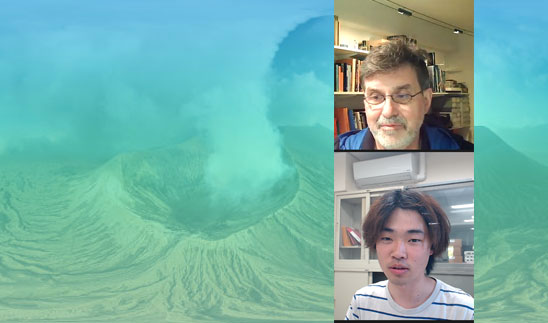Host Researcher in Germany:
- Prof. Dr. Matthias Hort, Institute of Geophysics, University of Hamburg
Activity
- No visit to Germany due to spread of new coronavirus
Aims:
- Learning analytic volcanic plume simulation model
- Building an international research corporation network with Hamburg University
Motivation for application
To construct an environment in which I can perform calculations of volcanic model without leaving my laboratory
I am currently researching in my laboratory the estimation of the profile of tephra concentration along a volcanic column. In order to discuss the validity of the obtained estimation results, it is necessary to compare the results from my estimation with results from another analytical volcanic plume model.
Therefore, I planned to visit the University of Hamburg, where the researcher belongs, during the fiscal year 2021 to perform simulations under simple conditions at the university’s computational facilities and to construct an environment in which I can perform calculations without leaving my laboratory. That is why I applied to the AIDA program.
Results
Performing calculations for a volcanic plume simulation model
I was issued a user account for the computing facilities at the University of Hamburg and accessed them from my laboratory, where I received lectures via zoom and performed calculations for a volcanic plume simulation model. I also participated in seminars via zoom, gaining knowledge of volcano research using research methods different from my laboratory and presenting my own work, which allowed me to broaden my own research horizons through discussions from perspectives different from those of the researchers I usually discuss with. Thanks to the rapid growth of online communication tools during the covid-19 Disaster, it was possible to carry out plans over long distances, but it was less efficient than staying in Germany and carrying them out intensively, and the opportunity to feel the atmosphere of laboratories in other countries and to look at my own research environment objectively was lost.
Outlook
By the lecture of operating a simulation code through this research exchange, I am learning how to simulate volcanic plumes in a way that is different from the approach I have been working on. I would like to continue my trial-and-error efforts to be able to perform calculations under complex conditions using the simulation code, and to deepen my understanding of plume dynamics from a broader perspective by linking it to the approaches I have been working on. Since I have gained experience in oral discussions in English, I would like to actively participate in international discussions in the future.

Online discussions with researchers at the University of Hamburg
![[間:AI DA]: supporting international carrier development of early career researchers (ECRs)](/exchange/aida/wp-content/themes/kyoto-u-daad/img/logo-aida.png)



